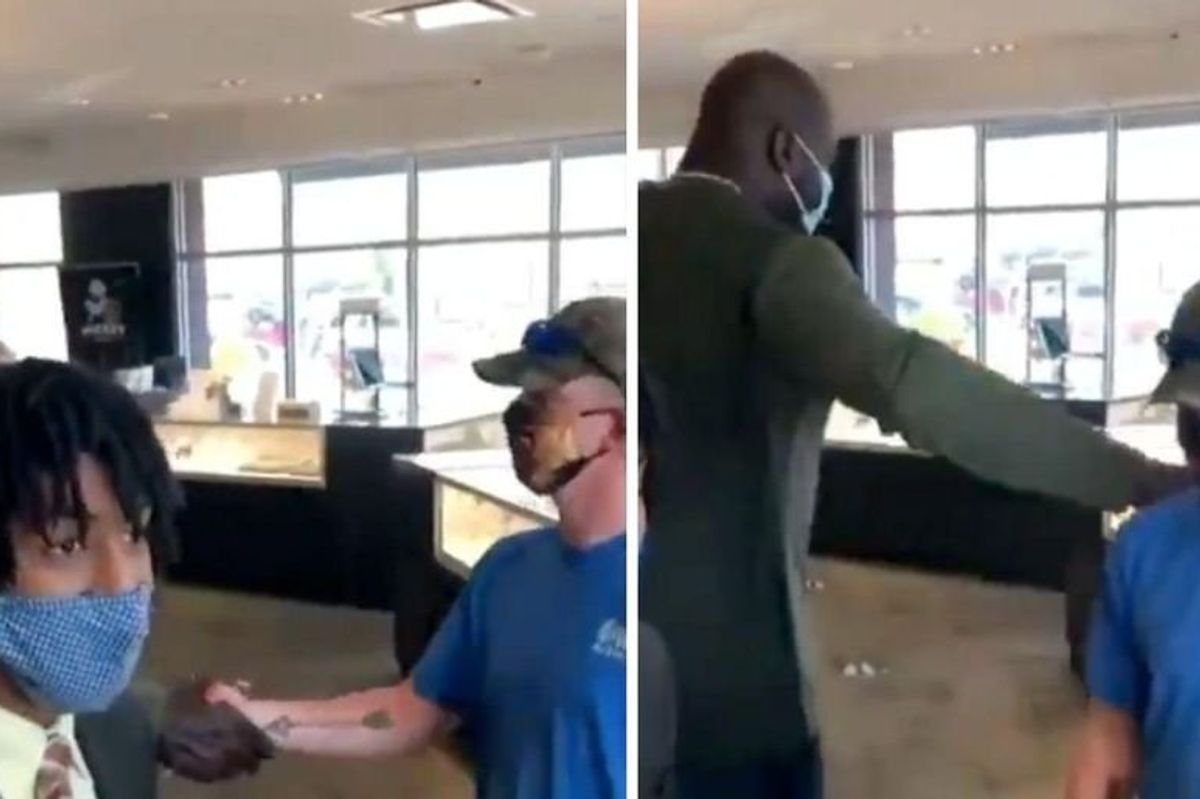Shaquille O'Neal secretly paid for a stranger's engagement ring while they were standing in line
His reason? "Trying to make people smile."
A guy shopping for an engagement ring got the surprise of his life from the NBS star.
Many of us like to daydream about what we'd do if we had more money than we know what to do with. And many of us like to picture ourselves being generous with our wealth, helping out random folks who could use some help.
Shaquille O'Neal, the 7' 1'' basketball legend known colloquially as "Shaq," seems to be someone who belongs to this category. Back in 2021, while at a shopping mall Zales, O'Neal gave an unsuspecting guy trying to pay off part of his engagement ring the surprise of his life.
As the young man talked with the clerk at the jewelry store counter about how much he still owed for his ring and when he'd be able to pay it off, an extraordinarily large hand handed the clerk a credit card. Shaq overheard their conversation and decided to take care of the bill himself. No big announcement. No fanfare. He just handed over his credit card, shook the stunned customer's hand and patted him on the back, and that was that.
Someone caught the moment on video and shared it, which prompted Shaq's co-hosts on NBA on TNT to ask him about it the next day.

One of the first questions was, "You went to the mall, and went to Zales?!?" Not exactly where one would expect a person with a $400 million net worth to be hanging out on a Monday, but Shaq pointed out that he has a jewelry line at Zales. He went in to get some hoop earrings. Alrighty.
The young man at the checkout counter was so shy, Shaq said, and when he heard him talking about paying for his engagement ring, Shaq asked him how much it was and offered to pay for it.
At first, the guy refused, but Shaq insisted. And apparently, he does these random acts of generosity all the time.
He said he was recently in a furniture store (seriously, do multi-millionaires not shop online?) and saw a mom with an autistic daughter buying furniture. He just took care of their bill, just because.
"I'm into making people happy," he said. "I didn't mean for that to get out because I don't do it for that...I'm just trying to make people smile, that's all."
Shaq's generosity is well-documented, despite his preference to keep much of it under wraps. In a 2015 interview with Graham Bessinger, he explained how his father's charity—despite their family not having a lot of money—influenced him.
After giving the family's bag of hamburgers to a homeless veteran, his father got into the family car and told him, "If you ever make it big time, make sure you help those in need."
Shaq remembered those words and engages in charity in a range of ways, "because of what a man who made $30,000 a year taught me," he said. "And a woman who was a secretary who probably made $20,000 a year—they taught me that."
His giving comes "from the heart," he said. He's not looking for attention or accolades—he just wants to make people happy.
"I'm doing this because this is what I was taught," he said. "I'm doing it because to walk in there and see a family, put a smile on their face for a day, that's just awesome to me."
- YouTube www.youtube.com
"That's my thing. I just want to make you smile," he said.
Shaq once asked a restaurant server how much of a tip she wanted, and when she quipped "$4,000," he gave it to her. When a 12-year-old was paralyzed by a stray bullet in a shooting, Shaq donated a whole house to his family. A fan who saw Shaq in a Best Buy offered condolences to the star for the untimely death of Shaq's friend and former teammate Kobe Bryant, as well as Shaq's sister Ayesha, who had recently passed away from cancer. He was treated to a new laptop—the best one in the store.

Charitable giving looks like a lot of different things, from funding organizations to distributing money through a foundation to handing over a bag of burgers to someone who's hungry. It's just delightful to see wealthy people who not only support official charitable organizations with money and time (Shaq serves as a national spokesperson for the Boys & Girls Clubs of America and is a member of the national Board of Directors for Communities in Schools in addition to raising and donating millions of dollars to various causes) but who also just help out random people everywhere they go.
Kudos to Shaq's parents for teaching him so well, and kudos to him for taking their lessons to heart.
This article originally appeared four years ago.

